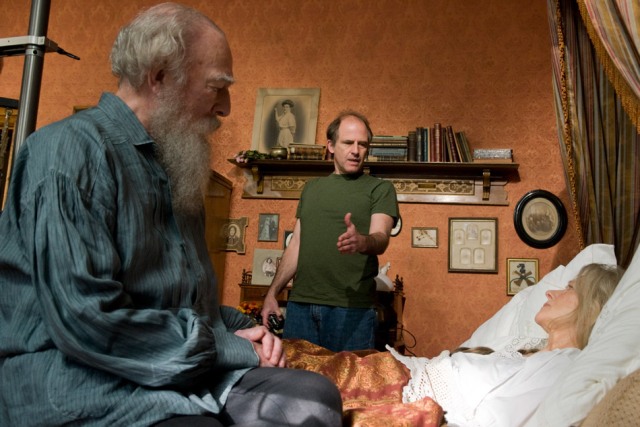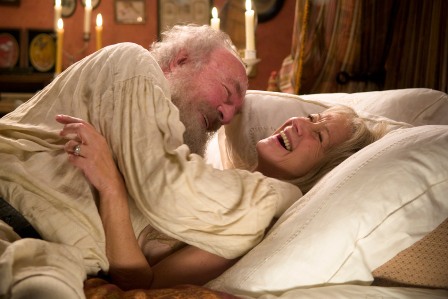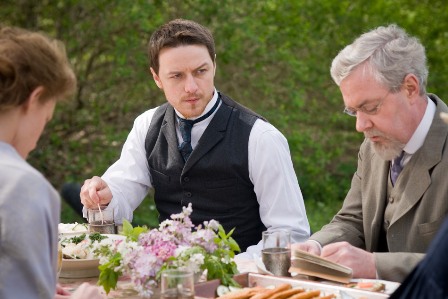CHICAGO – Patrick McDonald of HollywoodChicago.com audio review for the doc series “Charlie Hustle & the Matter of Pete Rose,” about the rise and bitter fall of the major league legend, the MLB’s all-time hits leader, only to be banned from the sport because of gambling. Streaming on MAX and on HBO since July 24th.
Interview: Michael Hoffman Stops at Academy Awards With ‘The Last Station’
CHICAGO – When the Oscar nominations were announced earlier this week one of the more unfamiliar titles was probably “The Last Station,” a historical drama nominated for Best Actress (Helen Mirren) and Best Supporting Actor (Christopher Plummer). The film has quietly been building buzz for the last few months and writer/director Michael Hoffman recently spoke to HollywoodChicago.com about it.
Plummer plays the legendary Leo Tolstoy, author of “War and Peace” and “Anna Karenina,” in the later years of his life when he denounced material things and became a social icon. As he approached his death, everyone wanted a piece of Tolstoy and his change in ideals created a divide between him and his wife Sofya, played by Mirren.

The Last Station
Photo credit: Sony Pictures Classics
As Hoffman says, “Sofya had this long period where she was his muse and his lover, gave him thirteen children, and wrote out “War and Peace” by hand six times and was at his side during the writing of “Anna Karenina”. And she finds herself with him waking up from this fever dream and deciding, “I’m no long interested in being Leo Tolstoy the Great Russian Writer; I’m Leo Tolstoy the Socialist Utopian Prophet. I’m renouncing my property, my family, my title.” She all of a sudden becomes invisible. Every argument, no matter what it’s about, is “How do I get my life back? How do I get the love of my life back?””
 The Last Station Photo credit: Sony Pictures Classics |
That personal drama is the “subtext” of a film about a country and really a world on the verge of revolution (the Russian Revolution would happen seven years later and the ideals of passive resistance preached by Tolstoy would influence Gandhi). Hoffman used his own marital history to inform the human drama of the story.
“It took being married for twelve years and re-reading the book for a second time [on which his film is based] to really kind of see the way in which I could make a film about the tragic comedy of marriage,” says Hoffman. “That really intrigued me. When I first met my wife I had a love at first sight experience. What ran through my head were two things: The party is over and this is the work of the rest of my life. That line where Sofya says to Tolstoy, “Why did you expect it to be easy? You’re the work of my life and I’m the work of yours.” I sort of see marriage as being a kind of work that re-forms who we are.”
The film clearly plays with themes of both marriage and following a leader or prophet in that, in both cases, one wants to impress and get the affection of another. As Hoffman says, “That’s the great difficulty of truly being married. Rilka has this thing where he says truly loving another person is the most difficult task that a human being has. The reason that he gives is that it’s almost impossible to believe that another person’s priorities are of equal value to our own. That’s really basically where most problems come from. I’m convinced that the things I need to get done are what needs to get done and my wife is convinced of the same thing. And those things can come into conflict and the first instinct is not to say, “Oh, you’re right, let me step aside.”
 The Last Station Photo credit: Sony Pictures Classics |
As for Tolstoy’s belief that wealth corrupts us all - “I think that there are a lot of things that distract us from a more spiritual life. Yeah, I do think that his belief in passive resistance is a really powerful technique and idea. He pioneered that idea and sent it on in a letter to Gandhi. So, that’s a really powerful idea. His focus on love and getting out of your own way in being able to love and being less obsessed with attachment…the Buddhist parts of what he was interested in…I think that they’re true. It’s very difficult to do…But how do you live that every day in the world? It’s not that they’re bad ideas, they’re just hard.”
As is clear in the film, Tolstoy hated his own fame. “It’s one of those weird things where he would say that his writing didn’t matter and the more he would say that he didn’t matter, the more he would matter. That was kind of what happened. He said I’m just like you and the more he did that the more elevated he became.”
Hoffman went back to Russia to get the blessing of the Tolstoy family, something that wasn’t easy to do. “On the part of the Russians in general, there’s a lot of suspicion about taking on a story that’s so important to Russian history. So, there was some discomfort with that. Plus, the Tolstoys are extremely protective of his legacy. They’re marketing him to the world in lots of ways. I think that Russians are very good at discerning sincerity. Obviously, we were sincere about wanting to make a legitimate film about Tolstoy and having a vision.”
“We went out and ate and drank a ton of vodka and cried at dinner - somehow, at the end of that process, they were on our side but were withholding full blessing. Then they read the screenplay and really didn’t like it. Well, there were things in it that made him feel uncomfortable. It was like I don’t know if I want them running around acting like a rooster and a hen.”
 The Last Station Photo credit: Sony Pictures Classics |
“I went back and said look, “I want to make the film and maybe we won’t get your blessing but I’ll show it to you when we can still make changes and absolutely take seriously what you have to say. I want to make a film that you care about and you like.” We showed them the film and they liked it. What Helen and Chris did - they came back and said, “This is closer to how we tell the story in our own family than any biography that’s ever been written.” That felt about as good as anything in the process.”
With several major nominations, including six Independent Spirit Award nods (the highest total this year) and two Oscar nods, it’s remarkable that Hoffman didn’t know if the film would be released just a few months ago. After shooting, the credit crunch made some of the early pre-sales come in much lower than expected and a few distributors passed. As of September 1st, 2009, it looked like “The Last Station” would never be released in North America.
“The one thing we had was that it had been selected for Telluride. So we went and the movie just played through the roof. From there, whether it’s a critic’s movie or not, it’s really an audience movie. From that point…we didn’t have a distribution deal until the second week of October. I said, “I don’t want to get involved this season unless we’re going to go for it.” I didn’t think we could maintain the momentum for the year. All the reviews out of Telluride were good. So let’s go for it. And they were completely on-board.”
Go for “The Last Station,” opening in Chicago theaters tomorrow, Friday, February 5th, 2010.
 | By BRIAN TALLERICO |


